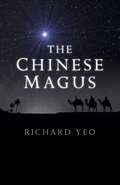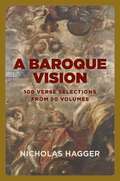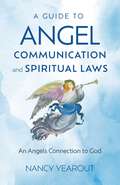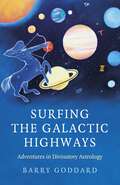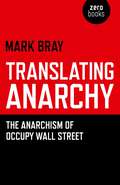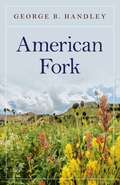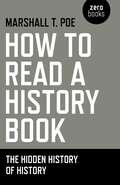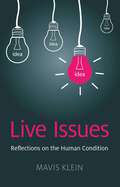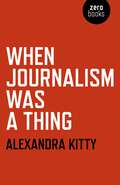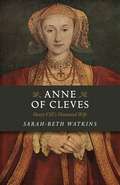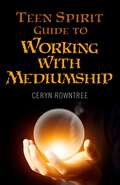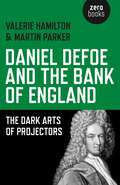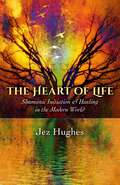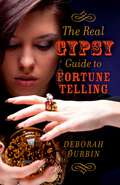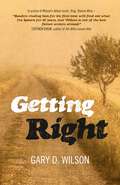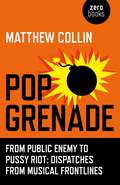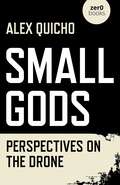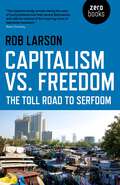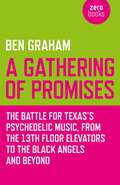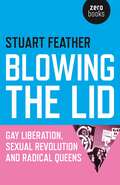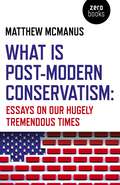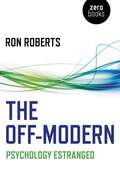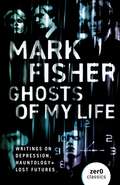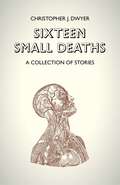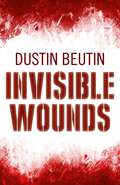- Table View
- List View
The Chinese Magus
by Richard YeoXiang Li is a cultured, rational Chinese Mandarin, Governor of Xinjiang Province. He sees a sign in the skies and falls under a compulsion to travel to the west in the depth of winter. Nothing is clear but that he must hurry. His journey takes him through the snow-choked passes of the Tian Shan mountains and the searing heat of the Syrian Desert, through ambush by evil tribesmen and the deadly court of King Herod, while ahead of him rises a light in the night sky...
A Baroque Vision: 100 verse selections from 50 volumes
by Nicholas HaggerBetween 1979 and 1982 Nicholas Hagger wrote three letters to the eminent literary critic Christopher Ricks about his poetic identity, and Ricks agreed with his final view that his verse blends the Romantic and Classical traditions within the Baroque tradition. In 1979 and again in 1982 Ricks asked him to select 30 poems. Forty years later A Baroque Vision presents a selection that shows his Baroque roots. Part One presents 30 poems written before 1979, and Part Two adds 70 verse selections written between 1979 and 2019. A Baroque Vision presents 100 verse selections drawn from 50 volumes of his poems, verse plays and masques. The Baroque style, which can be found in all European countries, combines the spiritual and the sensual, and features movement, transformation, the Mystic Way, the mysterious Light, the transcending of death, the divine soul and Heaven, as illustrated in Rubens' The Apotheosis of James I (shown on the front cover); and blends the Romantic and Classical traditions. In his Preface Hagger shows very clearly that his Baroque vision was behind, and grew into, his Universalism, his philosophy and worldview of the unity of the universe whose development can be traced in his Selected Letters and Collected Prefaces, and in the companion volume to this work The Essentials of Universalism (all published by O-Books). These 100 verse selections confirm that his Baroque vision is inspired by the 17th century (by the Metaphysical poets, Milton and Dryden), but also by the 18th and 19th centuries (by Pope, Wordsworth and Tennyson).
A Guide to Angel Communication and Spiritual Laws: An Angels Connection to God
by Nancy YearoutThis book was written to inspire humanity to connect back to Spirit/God and the Angelic Realm. We are energetic souls having a human experience, but we have lost our connection to source energy and our friends the Angels. The Divine spark lives within all of us, and to ignite that spark we need to connect to the heavenly realms of source energy and the natural forces of Mother Earth. These are the connections that bring the energy of joy, peace, harmony, and love into our lives. Within this book, you will learn how to connect to Spirt/God and to your Guardian Angel. You will also discover the Universal Laws that will strengthen this bond. My hope is that all of humanity connect with this Divine energy to bring love to each other and our planet.
Surfing the Galactic Highways: Adventures in Divinatory Astrology
by Barry GoddardAstrology has the power to take our breath away, to enchant us through the eerie synchronicities it reveals between sky events and earth events. Life presents us all with periods that are both challenging and potentially transformative. This book shows - in intimate detail and grounded in the author's personal experience - how the outer planets can be used to help navigate and illuminate those testing times. Astrology can guide us through the deep initiatory and transformative experiences that life, if we are willing, offers us - providing an affirmation of an intuitive, non-rational means of knowing that's central to who we are as humans, but undervalued and even denied in our modern age. Surfing the Galactic Highways is a refreshingly bold assertion of the intuitive, non-rational nature of astrological knowledge, and a thoroughgoing refutation of those who would relegate astrology to the status of a 'pseudo-science'.
Translating Anarchy: The Anarchism of Occupy Wall Street
by Mark BrayTranslating Anarchy tells the story of the anti-capitalist anti-authoritarians of Occupy Wall Street who strategically communicated their revolutionary politics to the public in a way that was both accessible and revolutionary. By "translating" their ideas into everyday concepts like community empowerment and collective needs, these anarchists sparked the most dynamic American social movement in decades.
American Fork
by George B. HandleyZacharias Harker is a brilliant botanist and an aging recluse. Haunted by his mistakes and living without his wife and daughter for the past twenty years, he hatches the idea to write his magnum opus, a book on the implications of climate change for humanity focused on the wildflowers of Utah's Wasatch Mountains. Just prior to the tragedy of 9/11, he hires a young artist, Alba, to paint flowers for the book. Over the course of their unlikely friendship, Harker convinces Alba to return to Chile to learn the story, long hidden from her by her mother, of her father's disappearance under Pinochet. Alba's discovery of her family history and her experience listening to the stories of Chileans who have resisted a government ruled by fear inspire her return to Utah with renewed purpose. As America grows more distrusting of immigration and diversity, Alba commits her art to the protection of the environment and to a more inclusive meaning of family and belonging while she and her husband, John, strive to learn Harker's hidden past and include him in their lives before it is too late. Rooted in the Mormon heritage of Utah but hemispheric in its reach, American Fork is a story of restoration and healing in the wake of loss and betrayal.
How to Read a History Book: The Hidden History Of History
by Marshall T. PoeA deconstruction of the modern history book as artifact, How to Read a History Book explains who writes history books, how the writers are trained, and why they write them. It also discusses genre, bias (political and otherwise) and how to read history books between the lines. Written for undergraduates, intro graduate students and anyone with an informed interest in the subject, How to Read a History Book demonstrates that, rather than being objects that fall from the sky, history books are actually socially-constructed artifacts reflecting all the contradictions of modern meritocratic capitalism.
Live Issues: Reflections on the Human Condition
by Mavis KleinThis book is a collection of 17 independent, opinionated and provocative essays on the various conceptual experiences of being human. Topics include: Ego States, Strokes and Transactions, Our Species, Duality Rules OK, Realities, Languages and Theories, Five Personality Types, Compound Personality Types, Personality Types in Relationships, The Enemies of Love, Men and Women, Morality, The Quest for Happiness, The Issue of Astrology, Life Stages, Zeitgeist, and The Life and Death of God. Most serious books are thought marathons; this serious book is a collection of thought sprints - perfect mind-bending for between stops on bus or train.
When Journalism was a Thing
by Alexandra KittyJournalism used to be a thing. It used to be a powerful and wonderful thing, yet now it has become a curiosity, and not even the Internet can resurrect it. When Journalism was a Thing considers the downfall and the reasons why, but also offers a model for a new approach to the once-noble profession.
Anne of Cleves: Henry VIII's Unwanted Wife
by Sarah-Beth WatkinsAnne of Cleves left her homeland in 1539 to marry the king of England. She was never brought up to be a queen yet out of many possible choices, she was the bride Henry VIII chose as his fourth wife. Yet from their first meeting the king decided he liked her not and sought an immediate divorce. After just six months their marriage was annulled, leaving Anne one of the wealthiest women in England. This is the story of Anne's marriage to Henry, how the daughter of Cleves survived him and her life afterwards.
Teen Spirit Guide to Working with Mediumship
by Ceryn RowntreeTeen Spirit Guide to Working with Mediumship is a brilliant and comprehensive guide to working and communicating with the Spirit world. Although primarily written for young adults, it can also be utilized by anybody wanting to start their journey into working with Spirit but struggling with where to go for advice or more information. In easy and clear steps, Ceryn Rowntree will take you through the basics of connecting with the Spirit world, to more advanced techniques, and how to do it in a safe way that's comfortable for you as an individual.
Daniel Defoe and the Bank of England: The Dark Arts of Projectors
by Martin Parker Valerie HamiltonThis little book tells the truthful story of how the Bank of England actually came into being. It is a story of pirates, treasure, random good fortune and sheer determination. This is an institution founded on risk, daring and imagination. The tale is entangled with that of the early novel, in particular the fortunes of one Moll Flanders, an entrepreneur of sexual relations in the growing London market for capital in the early eighteenth century. These accounts are woven together with the life-stories of Daniel Defoe and William Paterson, founders of two of the key institutions of our modern age, the novel and the corporation. This reveals connections which are nowadays forgotten, and which the fractured specialisms of &‘Literature&’, &‘History&’ and &‘Business&’ can rarely see. These tales are set against the backdrop of the long eighteenth century - fervent years of inventiveness, high risk gambling, and political revolution. The authors show that the dark arts of deceit, and the credibility of fictions, are requirements for any creative enterprise, and that all organizations are fictions.
The Heart of Life: Shamanic Initiation & Healing In The Modern World
by Jez HughesThe Heart of Life is an exploration into the depths of what it means to be alive, when the &‘cellophane packaging we wrap around life to keep it safe and sterile has been unwrapped and discarded&’. It reveals how the ancient path of shamanism and indigenous wisdom can offer us solutions to the many problems facing the modern world, both global and collective. It offers a unique cosmology that explores how these problems, from potential global ecological catastrophe to the multitude of mental and physical illnesses afflicting individuals, are intrinsically linked and how they can be treated. How the soul sickness that is affecting the modern world may well be the initiation we are going through as a species. This is illustrated through the personal and professional experiences of contemporary shaman Jez Hughes, who cured himself successfully of convulsive fits and mental illnesses using shamanic methods and has since gone on to treat thousands of people in the same way.
The Real Gypsy Guide to Fortune Telling
by Deborah DurbinThe Real Gypsy Guide to Fortune Telling is a concise yet comprehensive guide focusing on different types of fortune-telling and divination techniques that are easy and safe to use. Easy to understand and written by an expert intuitive with over 30 years' experience, the book will take you through Tarot Reading, Rune Reading, Tea-Leaf Reading, Angel Card Reading, and much much more.
Getting Right
by Gary D. WilsonSuppose your more than mildly irritating leech of a sister calls you, as she usually does wanting money, only this time she says instead that she has cancer and in the course of the conversation challenges you to write the story of her life. You say, sure, you'll do that but you'll tell it the way you see it. The tale that emerges involves not only the dying sister, Connie, but brother Len as well. And it's also about "me," the sibling invited to narrate their shared story and whose interplay of memory and imagination raises the question of whether "the truth" of Connie's life - or of anyone's for that matter - can ever be known.
Pop Grenade: From Public Enemy to Pussy Riot - Dispatches from Musical Frontlines
by Matthew CollinAn adrenalin-charged trip through some of the cultural flashpoints of the past few decades, Pop Grenade celebrates the power of music as a force for change. Based on first-hand, personal reportage from raves, riots and rebellions, it explores how music has been used as a weapon in struggles for liberation and attempts to create temporary paradises. From Berlin&’s anarchic techno scene after the fall of the Wall to outlaw sound systems in wartime Bosnia, from Moscow during the crackdown on Pussy Riot to New York in the militant early years of hip-hop, it tells the extraordinary stories of some of the world&’s most audacious musical freedom fighters, disco visionaries and rock&’n&’roll rebels with a cause.
Small Gods: Perspectives on the Drone
by Alex QuichoSmall Gods deconstructs the mythology of the drone: as soothing sound, aerial spy, and killing machine. When we say 'drone technology,' we can mean the tanpura, a plucked-string instrument originating in 16th century India, or the Gorgon Stare, an aerial surveillance technology designed by the US military - and evoke competing notions of terror and transcendence. Small Gods leans into this ambiguity. As each chapter focuses on the work of an artist with a unique understanding of 'the drone', the book illuminates myriad facets of these entangled technological entities. Opening with William Basinki's first glimpse of the ash-clouds of 9/11 - which spawned both The Disintegration Loops and the drone-driven War on Terror - the narrative then zooms into the representational sleights of hand of British and American artists preoccupied with the West's stake in endless drone wars. Its midsection lands us in the doldrums: where Anne Imhof's Angst, Anna Mikkola's drone-watched runner, and Atef Abu Saif's drone war memoir find maddening safety in boredom, raising questions about the trade-offs between security and surveillance. In the final section, the narrative uncouples from earthly oppression - we're freed to explore future and spirit worlds with artists including Korakrit Arunanondchai, Lawrence Lek, and WangShui, all of whom use drone technology to envision a future beyond the burden of colonialism, racism, exclusion or, simply, representation. Empty metal becomes a vessel for escape, connection, or intention; a future-facing spirit, a ride into the afterlife, a god or a ghost.
Capitalism vs. Freedom: The Toll Road to Serfdom
by Rob LarsonFor years, we&’ve been taught that capitalism is good for freedom. Dominant right-wing talk radio hosts to this day recommend &“libertarian&” classics like Hayek&’s Road to Serfdom and Friedman&’s Capitalism and Freedom that claim markets free us, and this picture still dominates the schools and the political spectrum. Well get bent, one percent, because Rob Larson&’s Capitalism vs. Freedom: The Toll Road to Serfdom puts big business under a microscope. This book debunks the conservative classics while demonstrating that the marketplace has its own great centers of power, which the libertarian tradition itself claims is a limit to freedom. In fact, Larson illustrates how capitalism fails both this and other concepts of human liberty—not just failing to establish a right to a share of society&’s production, but also leaving us subject to the great power plays of the one percent&’s corporate property.
A Gathering of Promises: The Battle for Texas's Psychedelic Music, from The 13th Floor Elevators to The Black Angels and Beyond
by Ben GrahamA Gathering of Promises is a history of acid rock and psychedelic music in and from the state of Texas, focusing largely on its mid-1960s origins with the 13th Floor Elevators and contemporaries such as the Golden Dawn, the Red Crayola and Bubble Puppy, and following its development to the present day and the popularity of the annual Austin Psych Fest. Grounded in a strong social, cultural and historical context, the book asks how Texas produced some of the most extreme and influential psych of any era despite a prevailing social ethos of Christian conservatism and the strictest drug laws of any American state. It looks at how this environment shaped and affected the music, alongside the Texan frontier spirit and its championing of expansion, freedom and individualism.
Blowing the Lid: Gay Liberation, Sexual Revolution and Radical Queens
by Stuart FeatherThe Gay Liberation Front founded in 1970 urged gay men and gay women to unite around a simple set of demands among which were calls for an end to discrimination against homosexuals in employment, in sex education, in the age of consent and in being treated as sick by the medical establishment. GLF saw itself as a people&’s movement for gays, socialist by virtue of its demand for social change, and revolutionary in recognizing the rights of other oppressed minorities to determine the fight for their own demands. All history is personal. The author of this political memoir is the first participant of the Front to write a history of the lesbians and gay men who joined Gay Liberation and through a process of Coming Out and radicalization initiated an anarchic campaign that permanently changed the face of this country.
What Is Post-Modern Conservatism: Essays On Our Hugely Tremendous Times
by Matthew McManusWhat is post-modern conservatism? How it has come to dominate the political landscape in many developed countries? Edited by Matt McManus, Professor of Politics and International Relations at the University of Tec de Monterrey, What Is Post-Modern Conservatism touches on how technological, economic, and social transformations of the post-modern epoch have brought about a political landscape where the irrational and traditionalist aspects of conservative thought have mutated into the hugely tremendous forms we see today. With contributory essays from Dylan De Jong, Erik Tate, Borna Radnik, David Hollands and Conrad Hamilton.
The Off-Modern: Psychology Estranged
by Ron RobertsSociety is undergoing a process of deep change and transformation as the neoliberal order moves into crisis. Contemporary psychology, mired in exceptionalism and individualism, fails to address this broader context and continues with a fragmented reductionist approach which is alienating to students and practitioners alike. In the lifetime of the discipline there have been several distinct frameworks to emerge - psychoanalytic, behaviourist and cognitive. To these one might add Kelly&’s Personal Construct Theory as the last attempt to present a coherent and challenging framework for how to understand our lives. As society moves into a new phase, Ron Roberts argues the need for a new way of &‘doing&’ psychology which challenges not only the existing epistemological and reductionist outlook, but the centrality of a scientific professional discourse as a suitable vehicle for improving lives and making sense of the world.
Ghosts of My Life: Writings on Depression, Hauntology and Lost Futures
by Mark FisherThis collection of writings by Mark Fisher, author of the acclaimed Capitalist Realism, argues that we are haunted by futures that failed to happen. Fisher searches for the traces of these lost futures in the work of David Peace, John Le Carre, Christopher Nolan, Joy Division, Burial and many others.
Sixteen Small Deaths: A Collection of Stories
by Christopher J. DwyerSixteen Small Deaths is a collection of short fiction culled from nearly a decade of work from Boston-based author, Christopher J. Dwyer. The stories in the collection skirt the edges of noir, horror and science-fiction, sometimes bringing the hazy boundaries of all three genres together within a single piece. Sixteen Small Deaths will take the reader on a journey of heartbreak and terror while diving into the dark recesses of the mind.
Invisible Wounds
by Dustin BeutinIn May, 2010, Special Agent Morgan Huntley learns that a close colleague has been abducted while investigating the shocking murders of two soldiers within a NATO command facility in Kabul, Afghanistan. Within days, it becomes clear that his friend's investigation had uncovered a disturbing rumor: a group of retired U.S. Army personnel may have returned to Afghanistan to build a drug cartel, posing as defense contractors and utilizing the Army's own logistics network. With the clock ticking on both the case and his friend&’s life, Morgan accepts an offer to volunteer for an undercover mission to Afghanistan, posing as a civilian contractor. Upon arrival, however, Morgan learns that the kidnapping is but one small piece of a wider and more dangerous puzzle. Worse, Morgan's civilian cover story is immediately endangered when a close friend of his ex-wife becomes a key asset in his investigation. Invisible Wounds is a riveting thriller that navigates a world of hidden agendas, brazen deceit, and costly choices. Simultaneously gripping and fast-paced it is also a meaningful consideration of the generational costs of a decade of global conflict.
